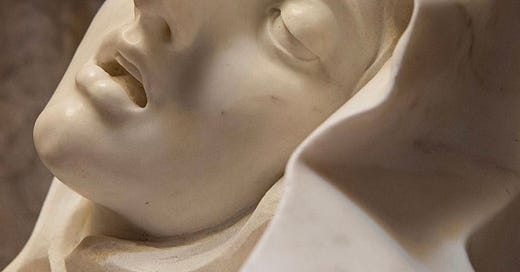When He touches me I clutch the sky’s sheets,
the way other lovers do
the earth’s weave of clay.
Any real ecstasy is a sign
you are moving in the right direction,
don’t let any prude tell you otherwise.
— St. Teresa of AvilaI’m absolutely masochistic about silent confessions at church. O Lord, tell me how I’ve been bad and make me beg for mercy. Chastise me for living imperfectly (forgot to return library books). God, how I love the bondage of Presbyterian traditions.
Occasionally, on Sundays, when we bow our heads and confess our sins, I sneakily open one eye just to see if everyone else is still doing it. Sometimes, when my mind is racing with Megan Thee Stallion lyrics, I fake it. And I wonder how many people in these pews are doing the same thing, just trying their best to blend in with the rest of the congregation with their heads down, eyebrows scrunched, seemingly focused on some scant memory in their mind’s eye.
Religion and the bedroom have a lot in common: it’s a place where you change clothes; it’s a sanctuary where a daily ritual full of fantasies and intrusive thoughts take place; it’s a holy ground where we dream and let the unconscious reveal its hiding spot; it’s a place where we focus on desire and try to get intimate with the One we want.
People often say that religion represses our nature because it shuns sexuality, but that’s wrong. Religion cares so much about sexuality because it understands that the battle people have with shame is a spiritual one. The fact that the people who care the most about sexuality are also the most pious tells us that sexuality is a matter of the soul, not just some physical act unworthy of holy consideration.
Piety can be hard to distinguish from erotica


Anyone who has felt the love of the Holy Spirit or some kind of spiritual awakening knows that St. Teresa was spot-on in her description of divine ecstasy (she would’ve made a fortune on Wattpad).
The 16th-century nun floats on a cloud of marble while a mischievous cherub rises above her and smirks as he pulls back a gold-tipped arrow, ready to plunge it deep into her limp body. In her autobiography, she wrote:
He appeared to me to be thrusting it at times into my heart, and to pierce my very entrails; when he drew it out, he seemed to draw them out also, and to leave me all on fire with a great love of God.
Her bare foot dangles over the edge, a naked appendage that scandalized conservative viewers when the sculpture was unveiled in 1652. When we look at her, our eyes are magnetically drawn to that helpless, pleasure-contorted expression, with delicately parted lips and eyes rolled backwards in their sockets.
The pain was so great, that it made me moan; and yet so surpassing was the sweetness of this excessive pain, that I could not wish to be rid of it. The soul is satisfied now with nothing less than God. The pain is not bodily, but spiritual; though the body has its share in it.
The soul craves excursions from literal reality (related). Even if it’s mystical and ephemeral, the soul craves flight.
It starts with DESIRE
It’s obvious when a man is overcome with lust: his pupils dilate with desire (the same way mine do when I browse Jimmy Choo or see the waiter bring my truffle fries) and a half-drugged, half-hypnotized look washes over his face. The sexual gaze is so powerful and intense it is very much like the religious gaze.
Back to the pews: we revere the moment when the pastor holds up the bread and wine so it can be seen by everyone present. Contemplating a holy object is an essential part of worship. The Catholic benediction is a rite of blessing where consecrated bread is placed in a shrine called the monstrance, from the Latin, monstrare, meaning to show, and offered for the sole purpose of gazing.
I don’t mean to be sacrilegious, but I can’t help but notice the parallel between the gaze of those reaching for the Pope as he walks through a barricaded crowd in Vatican City and the gaze of men walking through the red-light district, eyes glued to barely dressed girls posing behind glass windows. They may represent morally different situations, but nonetheless, it is the gaze of desire. Wanting, wanting, wanting…





